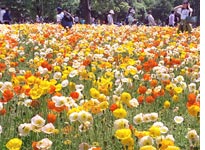Wednesday, May 25, 2005

A botanical jihad?
Afghan Poppycock
Hamid Karzai's halfhearted jihad.
By David Bosco
Posted Wednesday, May 18, 2005, at 4:16 AM PT
There's all sorts of good news coming out of the Afghan drug war. Hamid Karzai recently announced that opium cultivation might be down as much as 30 percent this year. In April, the United States nabbed alleged Afghan drug lord Haji Bashir Noorzai. U.S. and European money are helping Karzai's government build special drug courts and train paramilitary interdiction teams. One might almost be convinced that Afghanistan?site of an ongoing political renaissance?has pulled off another miracle.
Don't believe it. The truth is that the war against opium in Afghanistan is stumbling badly. A bureaucratic struggle on counternarcotics strategy inside the U.S. government produced an unhappy compromise. For its part, the fragile Afghan government is too timid to do serious crop eradication. There may be a drop in opium production this year, but it will be due primarily to recent flooding and to the huge stockpiles from last year's bumper crop.
The campaign is certainly not foundering for lack of passionate rhetoric. A few days after his election victory was assured last December, Karzai delivered a table-thumping speech to a collection of Afghan tribal elders. Afghanistan's booming opium trade, he said, was an affront to Islam. "Just as our people fought a holy war against the Soviets, so we will wage jihad against poppies."
The poppies may turn out to be the more stubborn foe. Afghanistan now produces more than 80 percent of the world's opium. In 2004, poppy cultivation reached an all-time high, and the drug economy now accounts for between a third and half of the country's economic output. A World Bank study estimates that opium cultivation can generate at least 12 times as much income as wheat, the main alternative crop. Because drug money flows to regional warlords and other malcontents, it threatens to derail an otherwise remarkably successful nation-building effort. (Last month, several more Taliban big fish accepted the government's amnesty offer and another batch of refugees returned from Pakistan, cheered on by Angelina Jolie.)
Karzai faces a torturous choice in trying to kick his country's habit. If he attacks the trade too aggressively, he could cripple the country's economy and generate a nasty political backlash. Aerial spraying is particularly touchy, since many Afghans still remember napalm runs by Soviet aircraft as they tried to crush the mujahideen. Rumors?unfounded, it appears?that spraying was under way forced Karzai to issue a flurry of denials and call in foreign diplomats for stern conversations. The United States is sensitive to Karzai's political limits, and outgoing U.S. Ambassador Zalmay Khalilzad helped deflect pressure for a massive eradication campaign. Karzai, the administration realizes, would be a terrible thing to waste.
But if Karzai moves too slowly, the drug trade may infect his country's fragile institutions and fill the coffers of violent opponents including, possibly, al-Qaida (the intelligence on where drug money ends up is spotty at best). According to former U.S. Assistant Secretary of State Bobby Charles, "One of the fastest ways you could design to cripple a young democracy is to allow the influx of substantial drug money."
In Washington, the opium dilemma has become a tussle between the State Department and the Defense Department. Curiously, the hawks on this issue are at State. Charles and his colleagues argued for large-scale aerial eradication and the involvement of U.S. and coalition military forces in interdiction. "The success we've had in Colombia, Peru, and Bolivia," he says, "has always involved the military."
The prospect of a militarized drug war makes the brass nervous. The Defense Department is keen to keep its footprint light and is wary of a drug war that could set the population against U.S. troops (last week's Newsweek-inspired anti-American riots will only deepen that fear). The Afghans, after all, have a history of kicking out technologically superior foreign soldiers. So the military has kept drugs on the back burner. Instead of getting its troops directly into the interdiction business, Washington is sending a few teams of DEA agents who will fly around the country in leased helicopters.
The generals aren't alone in resisting a full-on drug war. The idea is anathema to many regional experts, who believe that attacking Afghanistan's economic base without first establishing an alternative is political suicide. Barnett Rubin, an irascible NYU Afghan expert, has no patience for the drug warriors. "There's absolutely nothing to lead one to believe that you can abolish 40 percent of the economy without major implications." He argues for a slow, sequenced approach that begins by creating alternatives for Afghan farmers. Crop eradication, in his view, comes at the end?not the beginning.
That argument has had an effect, and U.S. policy has downshifted. Afghan officials, aided by U.S. contractors, are manually destroying some poppy fields, although it won't be many. Funds earmarked for massive eradication are being directed instead to supporting alternative livelihoods. (Rubin calls these funds a "a drop in the bucket.") For now, the Afghan drug war is a patchwork of sporadic manual eradication efforts, occasional clashes with traffickers, and a trickle of money to Afghan farmers for alternative crops.
It's a dangerous game for Karzai. Having called for jihad, his credibility is on the line. In deference to the president's exhortations, some Afghan farmers may have decided not to plant poppies this year. They'll be expecting assistance in return. If they don't get it, they may take out their frustration in this fall's parliamentary elections?or less constructively. Meanwhile, Karzai and his new security forces are poking at the country's nest of traffickers and drug labs without knocking them out. For the time being, Karzai and his Western backers have no choice but to hope they can continue cultivating a new democracy in a bed of poppies.
David Bosco is senior editor at Foreign Policy. He filed dispatches from Afghanistan last summer
